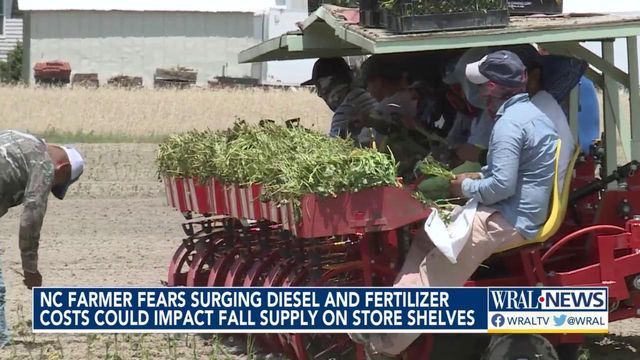NC farmers worry surging fuel, fertilizer costs could lead to empty store shelves in coming months
Farmers in eastern North Carolina say a spike in supply costs is preventing them from planting some crops this year.
Some farms tell WRAL News that unless fuel and fertilizer prices drop, families in our area could soon be feeling the impact in their daily lives.
In a field in Wilson County, tractors plant dozens of rows of sweet potatoes to grow in the coming months.
While it may look like everything’s going according to plan, the leaders of the operation say that couldn’t be further from the truth.
“We don’t know what our bottom line’s going to be,” Barnes Farming Corporation owner Johnny Barnes said. “We’re planting this crop right now just hoping for the best.”
Barnes told WRAL News that a spike in supply costs has rocked the agriculture industry.
It starts at the pump, where at $5.61, the price of a gallon of diesel fuel has more than doubled since May 16, 2021 when it was $2.37 according to the US EIA.
Some of Barnes’ tractors now cost $1,000 a day to fill up.
“When the price of fuel goes up, it makes the price of everything go up,” he said. “You’re going to see a shift in crops, you’re going to see some crops not be planted or not be planted as much.”
It goes beyond fuel prices.
The cost of nitrogen fertilizer has tripled since the summer of 2021 according to a report from Successful Farming.
Barnes told WRAL News that cost is leading some farmers to cut down production of fertilizer-heavy crops like corn or wheat, or avoid planting them altogether.
“That’s a huge problem,” Barnes said. “We’re looking at worldwide, globally, a huge wheat shortage.”
Barnes said with customers already facing record-high inflation, most of the stores that buy his produce have tried to avoid raising prices any further.
But with farms unable to bring in more money to offset these costs, customers could still end up paying the price.
“I’m afraid that, this fall, there’s going to be empty store shelves,” Barnes said. “Certain products are not going to be available.”













